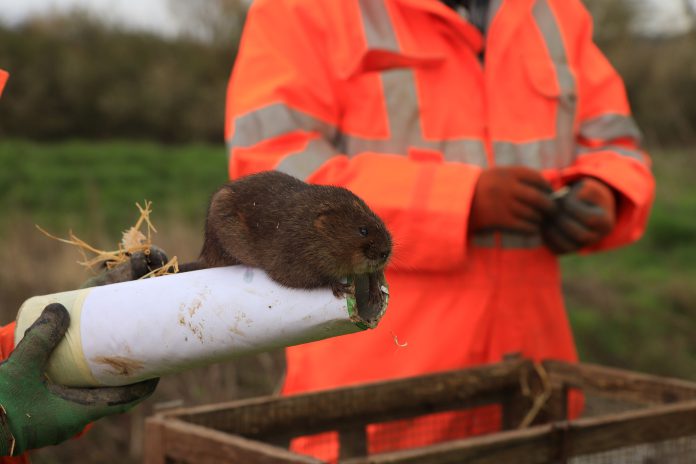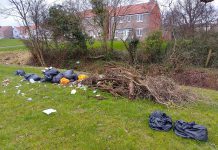Water voles are busily burrowing into a new home at one of the UK’s newest wetlands near Bristol after they were released onto the site. With its ditches and vegetation, the wetlands are the perfect habitat for these brown furry mammals which are amongst the most endangered species in the UK. Watch our video of the water voles arriving at their new home here.
The wetland, at Hallen, is part of over 80 hectares of new wetland habitats created by the Avonmouth Severnside Enterprise Area (ASEA) Ecology Mitigation and Flood Defence Project.
Nationally, coastal wetland habitat is one of the most valuable natural habitats, but it is under threat from rising sea levels because of climate change. The Severn Estuary is home to internationally important bird species and the new wetland habitat will help all manner of wildlife to thrive. The project is also planting hundreds of native trees to improve the environment for years to come. Water voles are environmental engineers, creating habitat for their burrows, and are a crucial part of ecosystems.
Before the water voles’ move to their new home, the team checked that the area was free of American mink (an invasive species), as the water vole population has been severely affected by this species in the UK. The team also checked the ditches for existing water voles to avoid any competition between the newcomers and resident animals. Once it was safe to move in, the voles were put in pens with plenty of straw and food so they could get used to their surroundings on the first day. On day two, the team put out a baffle on the front of the pen so the voles could go in and out.
All the voles have successfully been released. The team is allowing the animals to settle in before carrying out follow-up surveys.
The ASEA project is a partnership between South Gloucestershire Council, Bristol City Council and the Environment Agency. A joint venture between BAM Nuttall and Mott Macdonald (BMMJV) was appointed to undertake the detailed design and construction of the Avonmouth flood defences and wetland area.
Councillor Louise Harris, South Gloucestershire Council’s Cabinet Member for Climate and Nature Emergency, said: “We want to protect and boost nature through our climate and nature emergency work and, as part of this ecology mitigation and flood defence project, we are ensuring that a thriving environment will be established for people and wildlife. We’re optimistic that the water voles will colonise the new wetlands habitat and we’re proud to be helping this endangered species. With a network of ditches on site, the wetlands have real potential to become a stronghold for them.”
Councillor Kye Dudd, Bristol City Council’s Cabinet Member for Climate, Ecology, Waste and Energy, said: “Over the last 40 years the water vole population has dropped by 90 per cent, putting the species at serious risk of extinction. These new homes are a step towards supporting the species away from that risk and I’m pleased we can play a part in helping their population grow. We’re committed to enhancing our natural environment and providing a huge boost to nature and wildlife projects such as this – working across the organisation as part of our Ecological Emergency Action Plan.”








